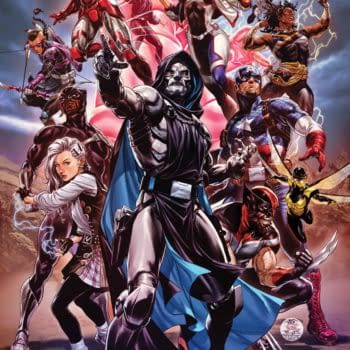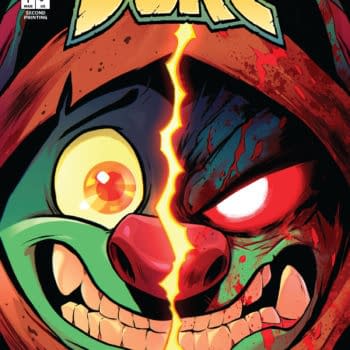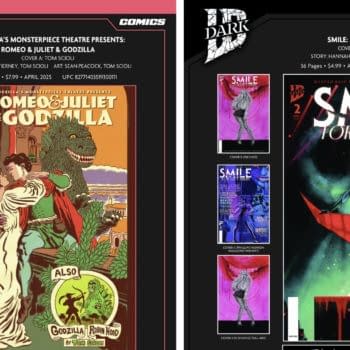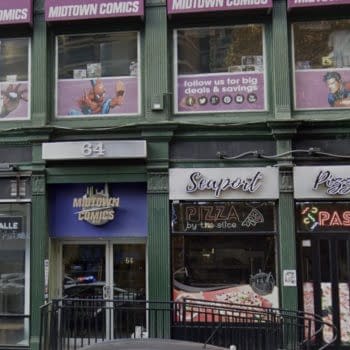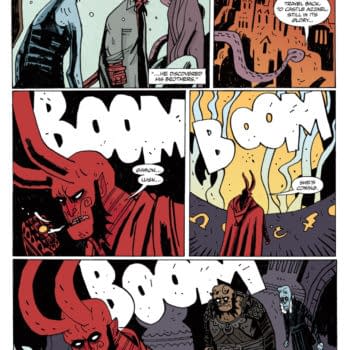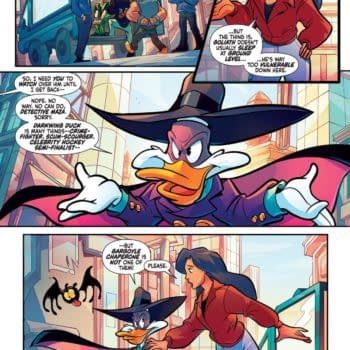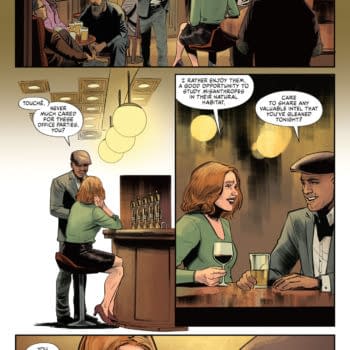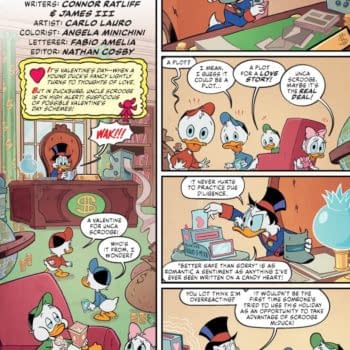Posted in: Comics | Tagged: Comics, entertainment, michael davis, michaeldavis, milestone
Deal Or No Deal – Michael Davis, From The Edge

Last week I wrote about how I flaked on Stan Lee by canceling my appearance at Stan Lee's Comikaze Expo. I was invited to participate in a panel discussion called Alternative Distribution in Comics, but alas, I was unable to make it.
Because I'm a man of my word, I decided I'd share not just my thoughts on the subject, but a step-by-step "how to do it" because I've done it.
Before I enlighten you, I'd like to address a few comments from last week. Someone wrote that my article was about absolutely nothing.
No. It was about something.
It was about how I flaked on Stan Lee by canceling my appearance at Stan Lee's Comikaze Expo. I was invited to participate in a panel discussion called Alternative Distribution in Comics, but alas, I was unable to make it.
Got it?
No?
Okay, how's this…
It was about how I flaked on Stan Lee by canceling my appearance at Stan Lee's Comikaze Expo. I was invited to participate in a panel discussion called Alternative Distribution in Comics, but alas, I was unable to make it.
Another comment mentioned that I keep telling everyone how important I am, clearly calling me a braggart.
It's not bragging if you can do it.
Don't hate the playa son, hate the game, or better yet, learn to play.
Another reader hates my writing style. I actually respect that. I get that. I'm like porn — not for everyone, but those who like my writing also end up with a happy ending.
I'll admit I lose sleep when someone doesn't like me. I lie in bed all night, thinking of ways to appease everyone.
No. No I don't.
What follows is a never-ending narrative for me. 20 years ago I began writing about business in Comics Buyers Guide and Diamond Retailor. A few years ago ago a version of this article was published in Comicmix. This is not just an updated version what's written here and in the series will contain just as much if not more original material.
A long time ago, in an industry far, far away…
It all started with a great idea: comics in the school system.
I'm not the first guy to think of that, not by any means. In fact, both Marvel and DC have had some comics in the schools one way or another for decades. Those "educational" comics covered subjects such as drug abuse, world hunger, gun safety, child abuse awareness and prevention, and various other public service content.
What made my idea different was this: I wanted to create a comic book universe that would be a complete reading program with study and teacher guides that would allow for a specific curriculum to be taught.
Where people go wrong when they try to do something new or groundbreaking is that they think that a great idea is all you need.
Err, no.
My idea was neither "new" nor "groundbreaking," but my program was both.
I had to go through a series of steps to get into the school system. Steps that included questions that had to be asked. These are questions that anyone who's serious about a professional commercial venture should ask. If your goal is to create an impressive bullshit-bells-and-whistles power point that will impress no one but you, skip this and enjoy your extra tips during the holiday season washing windows at a downtown shopping center traffic light.
Step 1: Does your idea have merit?
In other words, is it a good idea to anyone else but you?
I knew my idea had merit because it just made sense. I knew this on a personal level because the summer I discovered comics I went from a fourth grade student with a third grade reading level to a fifth grade student with a ninth grade reading level. I knew this because I had to attend summer school that year to be promoted into the fifth grade. I tested at a third grade level in late June and a ninth grade level in late August.
Why had it not been done before with a major publisher? That was the question I had to think about. That led me to my next question and step:
Step 2: What are the barriers to entry and why has this not been done before?
I spent weeks researching that. That's another reason people fail: they think a good idea is somehow magically going to go away or get stolen if they don't move the moment they think of it, so they don't do their due diligence.
Unquestionably the reason there was no comic book reading programs taught as a curriculum is because of educational prejudices that were applied (at the time) against comic books.
Simply put, no one wanted to see The Hulk in a textbook.
When I ran this little tidbit by my then-girlfriend, she responded, "That's silly! Kids love comics!" True, kids love comics, and very few kids would frown on reading them in school.
BUT you are not selling to the kids — you are selling to educators and parents. That's another thing that keeps great ideas from becoming reality. Often the idea is too big or too expensive. Yes, I'd love to see a Justice League Vs. The Avengers movie.
Who wouldn't?
Everybody in comics thinks that's a great idea.
The sheer amount of work and money it would take is not the issue or it's not the main issue. The amount of cooperation, collaboration and teamwork it would take between Disney & Warner Brothers makes this a non-starter. Spare me the "Oh they should just stop being stupid" comment.
Hollywood is a great place to work until it isn't. Terrence Howard, a friend and a great actor, was pretty much blacklisted because his agents wanted to renegotiate for Iron Man 2. Someone rubbed someone the wrong way, and Terrence went from co-starring in Iron Man with Robert Downey Jr., co-starring in the Brave One with Jody Foster, receiving an Academy Award-nomination for best actor in Hustle & Flow, to 6th place billing in the "Best Man's Holiday."
But that's OK. He's about to blow up again. Trust me I know.
On the flip side, Kim Kardashian sucks and fucks in a sex tape, yet she gets a reality show AND a line of clothing targeting young girls.
Where? Why Sears of course, where America shops.
So thinking just because something makes sense in Hollywood, like a good idea, will be an easy sell is akin to thinking a marathon is easy to run because you saw it on TV.
Yet another reason why most fail at this sort of thing: the idea is everything to them. They focus only on the audience that the idea would be great for.
Very seldom is the end user the gatekeeper.
And when I say seldom I mean never.
How many times have you seen a TV show and it just sucked?
When's the last time you felt gipped because you spent ten bucks on a movie that was just bad? Have any comics for which you wished you could not only get your money back, but also find the creative team and beat them with your copy?
I'm sure the vast majority of the readers of this article have experienced some, if not all, of the above. Here's the thing: that TV show, movie, and comic book all started out as a good idea to somebody. I've had much better ideas, and so have you, than certain things I've seen in the movies or on television. Yet somehow the shitty stuff is on TV, and my idea is not. The stuff I've sold and / or seen produced on TV are not what I consider my best ideas.
Whatever makes it on TV some person involved figured out and dealt with the barriers to entry.
What happened when the movie or TV show was being filmed is not the problem you should be worried about while you are looking to sell your idea.
That's another reason people fail. They ask for outrageous things the moment someone shows an interest. I have a dear friend who killed a huge animation deal at DreamWorks because he insisted on directing. He never directed anything in his life, so guess what happened to his idea?
It went from a DreamWorks movie to just being another idea — another unsold and unrealized idea. Most people will not tell you the following, but I will — ideas are a dime a dozen. Ideas are cheap, and there is very little new under the sun.
By no means is anything I wrote or anything I've managed to sell a magic bullet for a deal closing. I've killed a deal or 50 in my career with bad moves, and most likely will again.
My first priority is always to sell the idea — the actual idea is secondary.
What good is any idea if it just stays an idea?
So, back to the questions I ask:
Q. Did my idea have merit?
A. Comics in the school system. Duh, duh, triple duh.
Q. What were the barriers to entry?
A. Like I mentioned, after researching, it was obvious the reason why there were no comic book reading programs taught as a curriculum were because of the educational climate and prejudices that were associated (at the time, which was 1996) with comic books, superheroes were not considered educational on any level.
Q. If such a good idea, why had it not been done before?
A. Marvel and DC were light years away from my brilliance! Only I was smart enough to figure out how to get into the school system as a curriculum! Me and me alone!!
Or…Marvel and DC were simply not interested enough in the market to approach it the way I did, which was as first as a curriculum and secondly no superheroes. Marvel and DC are in the branded entertainment business. To them it's about selling Spiderman and Superman.
Again, the idea of comics as a learning tool and comics in the school is not a new idea, and certainly not just my idea. I realized that idea was a good one, but it was a huge one.
Realizing the idea was too big, I fine-tuned it to a smaller, more manageable and focused idea, and that was the following: comics in the schools as a reading program for grades 4-12.
A curriculum-based program, complete with lesson plans and teacher guides.
From my research, I recognized that most states have different guidelines for their schools. No matter how smart, well executed, and necessary (I thought) my reading program was, it would never be seen in a state unless it adhered to those states guidelines.
So how did I get around that? Did I do a program for all 50 states?
Err, nope. Just two.
One for California using their guidelines, and one for Texas using their guidelines.
Why California and Texas? Why not my once beloved New York and some other state I don't hate, like I hate both California and Texas? Because there are no bigger players in the textbook market than California and Texas — where they go, goes the nation. Seriously, I can't stand Texas and have no love for California, but this, as they say, is business.
Did I care about the other 48 states and Puerto Rico? Nope. Not for this deal. Sometimes less is more. Remember, I'm trying to get my reading program into the schools all over America, but attempting to do it immediately was foolhardy at best, and stupid as shit as worst. I knew the audience (educators) and end users (students). From there, I created The Action File Universe. That part wasn't easy, but compared to the next step it was a walk in the park.
End Part One.







